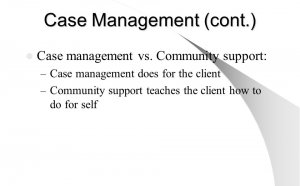
Case Management nursing definition
One of the significant criticisms of your current health system is the fact that it's many times centered on offering episodic attention – that's, dealing with clients for a severe problem without after up, setting up a patient/provider relationship, or emphasizing wellness and prevention. Episodic treatment has disadvantages for everyone involved. Providers can't view customers holistically, like if you take their particular socio-economic situations or family history into consideration. Patients with a chronic illness come to be especially susceptible to complications and undesireable effects. And insurers usually end up purchasing high-cost er interventions, in place of continuous major treatment that aids overall health.
Preferably, our bodies must evolve toward better continuity of attention, also higher integration across the entire continuum of treatment. The thought of the continuum of attention has been defined in several methods. More extensive meaning, possibly, is this one:
A patient-oriented system of care that covers a complete lifetime, comprises both services and integrating mechanisms, and guides and tracks clients eventually through a comprehensive assortment of wellness, psychological state, and social solutions across all levels of intensity of attention.
Since the continuum includes these types of a wide range of solutions (acute care, ambulatory care, homecare, longer care, health programs, etc.), it'll probably not be totally smooth. The medical industry is making great advances toward following integrating mechanisms that help continuity of care and transitions of treatment. The purpose of integrating health solutions is supply quality, cost-effective take care of everyone, but especially for patients with complex or persistent conditions.
Four integrating systems in particular depend on nursing areas that support continuity of treatment. They've been:
- Community-based services. House wellness nurses can help expand the continuum by visiting customers in the home to do assessments and provide important services. Telemedicine works like remote tracking can increase the continuum even further by permitting nurses to coordinate services and plan interventions for outlying residents.
- Disease administration programs. Clients with a persistent disease like diabetes or congestive heart failure will benefit from nurse-led quality initiatives that are designed to meet the specific requirements for the group. Nurses with a niche in illness administration can coordinate a complete spectrum of services geared towards correcting behavioral, economic, and environmental obstacles to care, being market healthy actions additionally the self-management of persistent circumstances.
- Wellness information systems. A information system is important to smooth transitions over the continuum. To supply high-quality, affordable care, providers require information that follows the patient as time passes across various health configurations and geographic boundaries. Nurse informaticians can have a confident effect on the design of patient-centric systems.
- Situation management services. Over the continuum of care, no where are customers much more susceptible than at change things, if they move from one standard of treatment to some other. Nurse case supervisors can successfully coordinate changes of treatment, including release preparation and end-of-life preparation.
Share this Post
Related posts
Nursing Case Management Certification
Exactly what you’ll do: You’ll coordinate maintain patients recovering from serious injuries or illnesses and the ones experiencing…
Read MoreCase Management Services definition
Case administration is a multi-step procedure to make sure prompt accessibility and control of medical and psychosocial services…
Read More
















